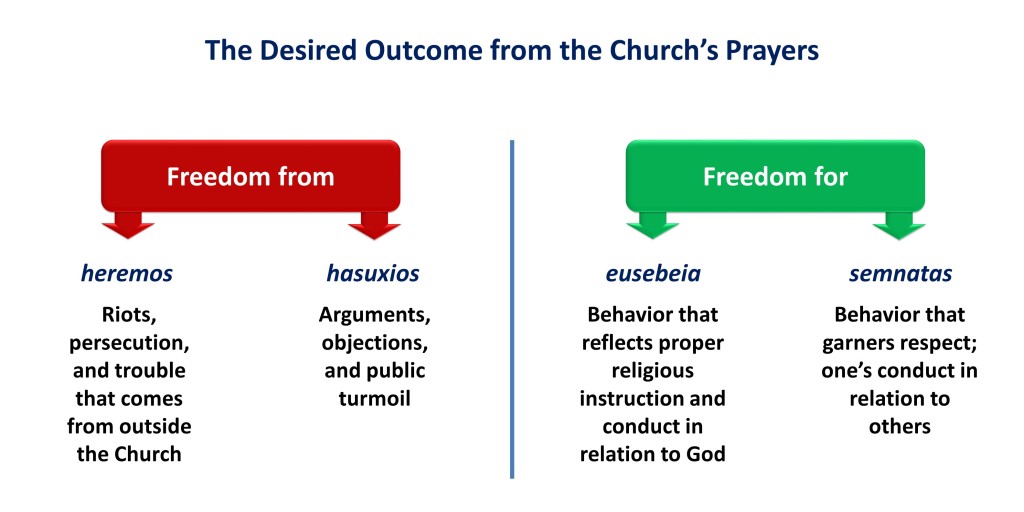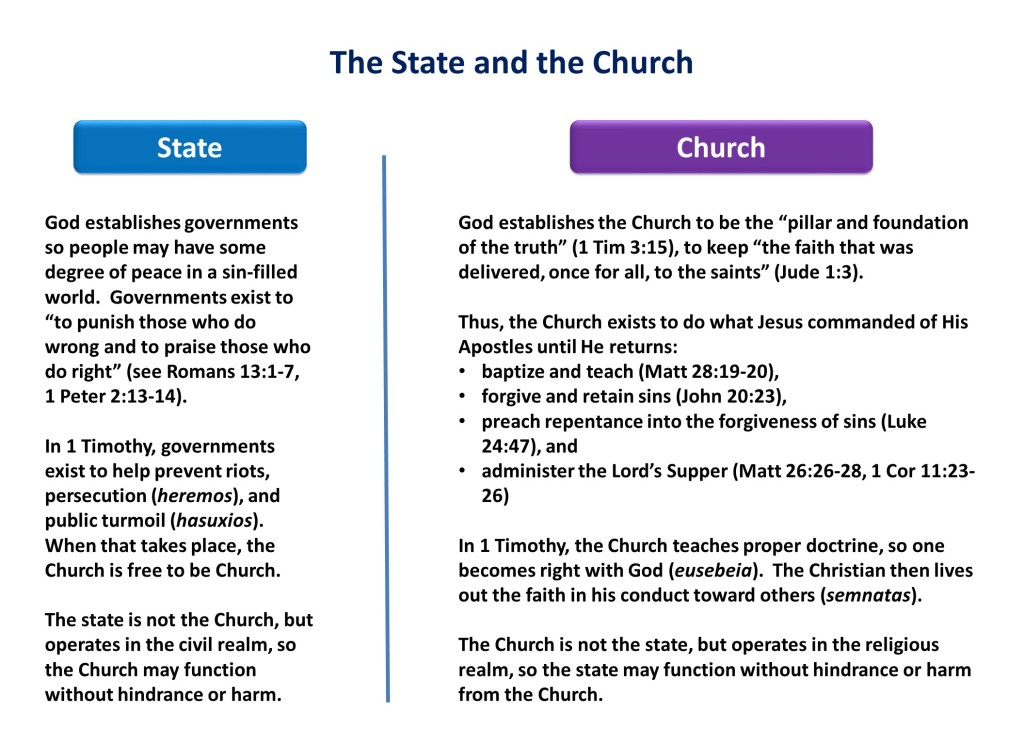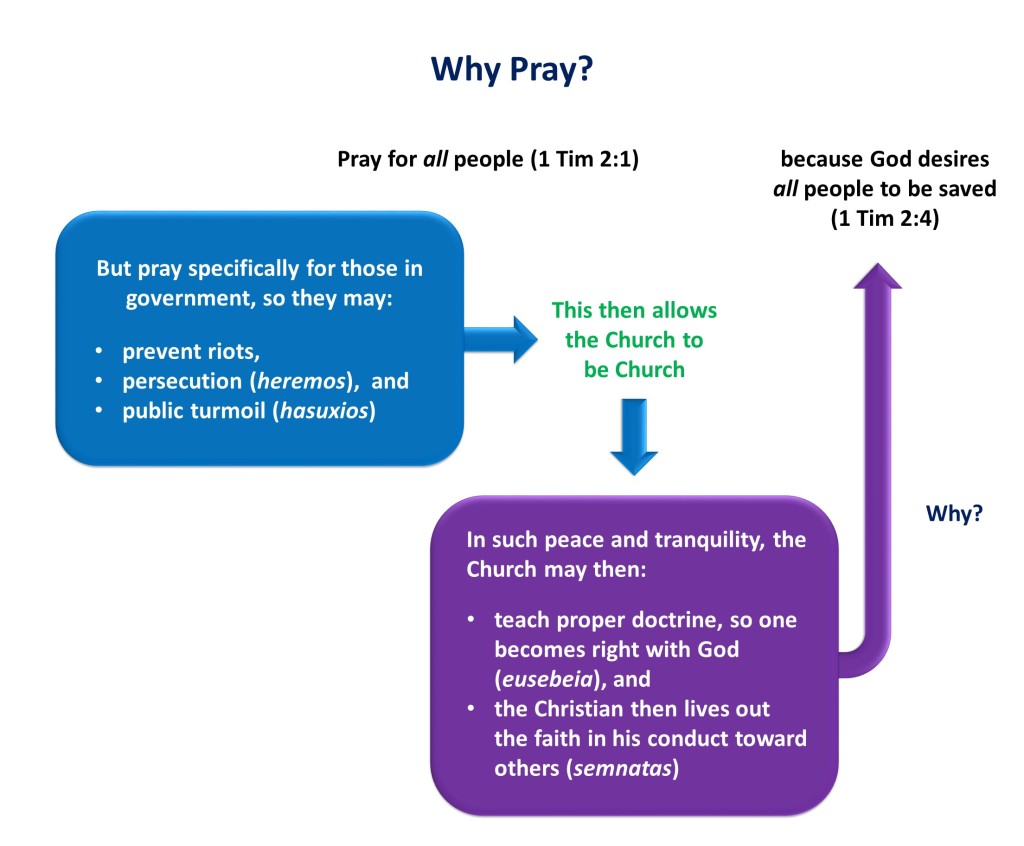 Having commanded Timothy to “wage the good war” against the false teaching and teachers, Paul now shifts his focus to the Church and worship, “so you may know how someone should conduct himself in God’s household” (1 Timothy 3:15).
Having commanded Timothy to “wage the good war” against the false teaching and teachers, Paul now shifts his focus to the Church and worship, “so you may know how someone should conduct himself in God’s household” (1 Timothy 3:15).
The Church in Prayer
Read 1 Timothy 2:1a
Paul begins this section with a “so then.” This means that Paul was connecting chapter 2 (proper worship) with what preceded it (false teaching and false teachers). Paul is providing a remedy to the chaos that the false teachers created in the Ephesian congregation. We get an idea of what that chaos was by the remedy that Paul provided. To counteract how the false teachers and their teaching impacted congregational worship, Paul begins by listing how prayers in the Church should be conducted.
- When Paul urges Timothy to ensure the prayers during worship have a certain shape (supplications, prayers, etc.) and content, what does that say about the pastor’s role when it comes to prayer during worship?
- What are the implications of Paul’s urging Timothy instead of commanding him?
The What
- What four parts does Paul “urge” to include in the prayers that take place during worship?
Excurus: The shape of prayer during worship
Supplications: Greek, deasis: This refers to what is needed, from the verb dei, “it is necessary.” Supplication also has a the idea of speaking for another, whether to another person (as in 1 Maccabees 11:49) or to God (Psalm 6:9, 17:1, 39:12; Romans 10:1; 2 Corinthians 1:11, 9:14; Philippians 1:4, 19; 4:6). The New Testament, however, only uses this word in relation to God.
Prayers: Greek, proseuxa: This is the generic, and most inclusive, word for prayer (Psalm 39:12, Romans 12:12, 1 Corinthians 7:5). This word is usually used in the context where someone petitions another, like here. In relation to a supplication, proseuxa focuses on God’s general blessing and care for someone, where deasis focuses more on asking for some special need in someone’s life.
Intercessions: Greek, enteuxeis: This strictly refers to “intercessions,” “petitions,” or “appeals” on behalf of another (Romans 8:27 [the Holy Spirit interceding for the saints], 8:34 [Jesus interceding for us], 11:2, 15:30; Colossians 4:12; 1 Thessalonians 1:2; Philemon 1:4). It carries with a concern for others, particularly for someone’s plight or difficulty, even if it is doesn’t reach the level a “need.”
Thanksgivings: Greek, euxaristia: These are intentional expressions of thankfulness, including expressions of gratitude (Wisdom 16:28; 1 Corinthians 4:16; 2 Corinthians 4:15, 9:11-12; Philippians 4:6; Colossians 4:2; 1 Thessalonians 3:9).
What does all this mean? During worship, the focus is on praying for others. It goes to say that Paul doesn’t need to urge Pastor Timothy for the congregation to pray for itself, for we all too easily focus on that. But, because of our sinful inclinations, we do have to be told to focus our prayers outwardly.
All four descriptions tie in to praying for others: 1) for their specific needs, 2) that God would bless them generally, 3), for the difficulties that others face, even if those difficulties do not rise to the level of a “need,” and 4) including thanks to God.
———-
For Whom
Read 1 Timothy 2:1b-2a
- Whom does Paul say the Church should pray for in general?
- Whom does Paul say the Church should specifically pray for?
The Why
Read 1 Timothy 2:2b
- Paul lists four desired outcomes of God answering the Church’s prayers. What are they?
Peaceful: Greek, heremos: a relatively rare word that points to freedom from riots and persecution. It is being free from trouble that comes from outside of you.
Quiet: Greek, hasuxios: This is the cessation of arguments, objections, and public turmoil (Acts 11:18, 21:14, 22:2), so someone may be in a state of tranquility (1 Thessalonians 4:11, 2 Thessalonians 3:12).
Godly: Greek, eusebeia: behavior that reflects proper religious instruction (as opposed to the instruction of the false teachers in Ephesus) and conduct in relation to God.
Dignified: Greek, semnatas: behavior that garners respect in relation to others.
Read 1 Timothy 2:3-4
- What is the “this” to which Paul refers that is “good” and which pleases God?
- Why is “it” pleasing to God? In other words, what purpose does “it” serve?
All people to be saved: Note the passive voice. Salvation is not brought into being by the person who is being saved.
“And to come into”: This salvation is not achieved by being brought into the knowledge of the truth (if that were the case then Paul would have used a participle: by coming into… ). Instead, Paul describes, in part, what that salvation is—being in the knowledge of the truth.
Knowledge of the truth isn’t merely intellectual; it involves someone’s entire being—mind, heart, and will. Being saved into the “truth” isn’t a philosophical truth but revealed truth, the Gospel, the truth that leads to eternal life, which is Jesus Christ: “I am the truth” (John 14:6; see also 1 Corinthians 1:21).
The roles of Church and state that Paul reveals
Who Jesus Is
Read 1 Timothy 2:5
- Who is the one mediator between God and mankind? What does this mean?
John 14:16: [Jesus speaking to Thomas:] “I am the way, the truth, and the life. No one comes to the Father except through me.”
Read 1 Timothy 2:6-7
The Hebrew idiom, “the many,” referred to everyone. And so when Jesus said that He gave His life “as a ransom for many [or “the many”]” (Mark 10:45), He meant for everyone. “Many” was not meant to be restrictive. But just in case, to be extra clear, Paul explicitly didn’t use “many” but “all.”
Excursus: Does “all” mean all?
Ransom: Greek, lutron: The normal word for “ransom” is lutron. A ransom is a payment of some type meant to deliver someone from some type of bondage.
“Instead of”: But Paul adds a prefix, “anti,” to lutron, which means “instead of.” This means that Jesus didn’t just give Himself as a ransom, but that ransom serves an “instead-of” function. Instead of you suffering what you deserve because of your sins, Jesus has done that for you, “instead of” you. “Instead of” implies a present-tense application for the past-tense ransom that Jesus paid.
So, why then isn’t every saved? After all, Paul says that Jesus gave Himself as an “instead-of ransom” for all. More than that, He “is”—present tense!—the “one mediator” between God the Father and fallen humanity! Paul is clear” all means all.
“Testimony”: How Paul helps us understand salvation is what he says next. A “testimony” is not the event itself; it is someone seeing an event and then telling another what he saw. Think of someone testifying in a court of law; to be a witness, he had to see the event himself.
Thus, “the testimony given” is not Jesus paying the ransom but Paul (and/or the other Apostles) testifying to what Jesus did. The “the testimony given at the proper time” is when Paul (and/or the other Apostles) testify, by preaching and teaching what Jesus did and what that means. That “testimony” bridges Jesus’ death as the ransom, making it an “instead of” event, when Paul preaches and teaches in faith and truth (1 Timothy 2:7).
Today, pastors and Christians do not testify or witness, for we did not see and experience Jesus’ death and resurrection. Instead, we confess, which means to “say the same thing.” We confess the same faith and truth of Jesus to which Paul and the other Apostles testified.
We should notice the language change in the New Testament as it speaks to those who did not witness Jesus’ death and resurrection. Instead of testifying, they confess the Christian faith (1 Timothy 6:12), the Christian hope (Hebrews 10:23), and the Gospel (2 Corinthians 9:13). Notice that this idea of confessing is directed to those who had never seen Jesus. Such a situation remains true for us this day.
“All”: All means “all.” Jesus did objectively die for all and forgave everyone’s sins on the cross—that was His “ransom.” That is true even if no one believes it. Further, Jesus’ ransom is not just a ransom but an “instead-of ransom,” which gets applied to someone by “the testimony [for us, confession] given at the proper time.” That’s why Paul points to himself as a preacher and Apostle, a teacher in faith and truth (1 Timothy 2:6) right after his universal statement that Jesus ransomed Himself for all.
Later, in 1 Timothy 4:10, Paul again brings out the universal, objective truth that Jesus “is the Savior of all people.” But then he pointed to those who benefit from what Jesus did for all people: “those who believe.”
Click here to go to the next Lesson.





